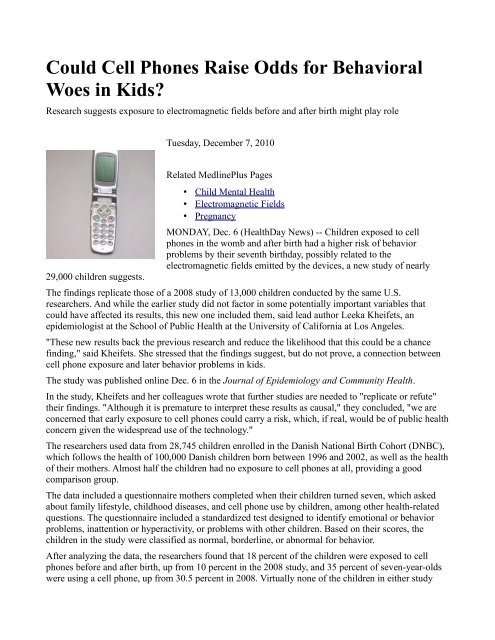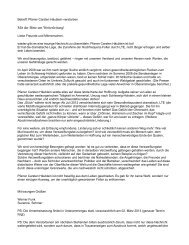3 Articles (English/German) about the study - Micro-ondes
3 Articles (English/German) about the study - Micro-ondes
3 Articles (English/German) about the study - Micro-ondes
Create successful ePaper yourself
Turn your PDF publications into a flip-book with our unique Google optimized e-Paper software.
Could Cell Phones Raise Odds for Behavioral<br />
Woes in Kids?<br />
Research suggests exposure to electromagnetic fields before and after birth might play role<br />
29,000 children suggests.<br />
Tuesday, December 7, 2010<br />
Related MedlinePlus Pages<br />
• Child Mental Health<br />
• Electromagnetic Fields<br />
• Pregnancy<br />
MONDAY, Dec. 6 (HealthDay News) -- Children exposed to cell<br />
phones in <strong>the</strong> womb and after birth had a higher risk of behavior<br />
problems by <strong>the</strong>ir seventh birthday, possibly related to <strong>the</strong><br />
electromagnetic fields emitted by <strong>the</strong> devices, a new <strong>study</strong> of nearly<br />
The findings replicate those of a 2008 <strong>study</strong> of 13,000 children conducted by <strong>the</strong> same U.S.<br />
researchers. And while <strong>the</strong> earlier <strong>study</strong> did not factor in some potentially important variables that<br />
could have affected its results, this new one included <strong>the</strong>m, said lead author Leeka Kheifets, an<br />
epidemiologist at <strong>the</strong> School of Public Health at <strong>the</strong> University of California at Los Angeles.<br />
"These new results back <strong>the</strong> previous research and reduce <strong>the</strong> likelihood that this could be a chance<br />
finding," said Kheifets. She stressed that <strong>the</strong> findings suggest, but do not prove, a connection between<br />
cell phone exposure and later behavior problems in kids.<br />
The <strong>study</strong> was published online Dec. 6 in <strong>the</strong> Journal of Epidemiology and Community Health.<br />
In <strong>the</strong> <strong>study</strong>, Kheifets and her colleagues wrote that fur<strong>the</strong>r studies are needed to "replicate or refute"<br />
<strong>the</strong>ir findings. "Although it is premature to interpret <strong>the</strong>se results as causal," <strong>the</strong>y concluded, "we are<br />
concerned that early exposure to cell phones could carry a risk, which, if real, would be of public health<br />
concern given <strong>the</strong> widespread use of <strong>the</strong> technology."<br />
The researchers used data from 28,745 children enrolled in <strong>the</strong> Danish National Birth Cohort (DNBC),<br />
which follows <strong>the</strong> health of 100,000 Danish children born between 1996 and 2002, as well as <strong>the</strong> health<br />
of <strong>the</strong>ir mo<strong>the</strong>rs. Almost half <strong>the</strong> children had no exposure to cell phones at all, providing a good<br />
comparison group.<br />
The data included a questionnaire mo<strong>the</strong>rs completed when <strong>the</strong>ir children turned seven, which asked<br />
<strong>about</strong> family lifestyle, childhood diseases, and cell phone use by children, among o<strong>the</strong>r health-related<br />
questions. The questionnaire included a standardized test designed to identify emotional or behavior<br />
problems, inattention or hyperactivity, or problems with o<strong>the</strong>r children. Based on <strong>the</strong>ir scores, <strong>the</strong><br />
children in <strong>the</strong> <strong>study</strong> were classified as normal, borderline, or abnormal for behavior.<br />
After analyzing <strong>the</strong> data, <strong>the</strong> researchers found that 18 percent of <strong>the</strong> children were exposed to cell<br />
phones before and after birth, up from 10 percent in <strong>the</strong> 2008 <strong>study</strong>, and 35 percent of seven-year-olds<br />
were using a cell phone, up from 30.5 percent in 2008. Virtually none of <strong>the</strong> children in ei<strong>the</strong>r <strong>study</strong>
used a cell phone for more than an hour a week.<br />
The team <strong>the</strong>n compared children's cell-phone exposure both in utero and after birth adjusting for<br />
prematurity and birth weight; both parents' childhood history of emotional problems or problems with<br />
attention or learning; a mo<strong>the</strong>r's use of tobacco, alcohol, or drugs during pregnancy; breastfeeding for<br />
<strong>the</strong> first six months of life; and hours mo<strong>the</strong>rs spent with her child each day.<br />
The investigators used <strong>the</strong> last two variables -- breastfeeding and hours spent each day with <strong>the</strong> child --<br />
as a proxy for <strong>the</strong> kind of attention mo<strong>the</strong>rs gave <strong>the</strong>ir young children. According to <strong>the</strong> <strong>study</strong>, this was<br />
partly to determine whe<strong>the</strong>r a mom who spent a lot of time talking on a cell phone during pregnancy or<br />
later might be less attentive to her children -- something that might also be linked to behavior problems<br />
in her offspring.<br />
"If breastfeeding and time spent with children are good measures of mo<strong>the</strong>r's attention, <strong>the</strong>n we believe<br />
that our results do not support inattention as a likely explanation for <strong>the</strong> observed association," <strong>the</strong><br />
researchers wrote.<br />
The research did find an intriguing association between children's exposure to cell phones and <strong>the</strong>ir<br />
behavior.<br />
Compared to children with no exposure to cell phones, those exposed both before and after birth were<br />
50 percent more likely to display behavior problems, <strong>the</strong> <strong>study</strong> found. Children exposed to cell phones<br />
in <strong>the</strong> womb, but not after <strong>the</strong>y were born, showed a 40 percent higher risk of borderline behavior<br />
problems. And those not exposed to cell phones before birth, but who were using <strong>the</strong>m by age seven,<br />
were 20 percent more likely to have behavior problems.<br />
One expert on child development who was not involved in <strong>the</strong> <strong>study</strong> commented favorably on its<br />
design.<br />
"The <strong>study</strong>'s methodology was rigorous and responsible. The researchers took into account as many<br />
possible variables as <strong>the</strong>y could, given <strong>the</strong> limitations of <strong>the</strong> data set," said Dr. Andrew Adesman, chief<br />
of developmental and behavioral pediatrics at <strong>the</strong> Steven and Alexandra Cohen Children's Medical<br />
Center of New York in New Hyde Park.<br />
More than 285 million Americans no use cell phones, according to <strong>the</strong> Cellular Telecommunications<br />
and Internet Association. Some studies have raised concern that <strong>the</strong> radiofrequency energy from cell<br />
phones may pose a risk to human health, but <strong>the</strong> association between cell phone use and health<br />
problems, including cancer and brain tumors, hasn't been conclusively proven.<br />
In <strong>the</strong> past few years, new sources of radiofrequency energy, such as wireless networks and radiofrequency<br />
identification (RFID) tags used to track products, collect tolls on highways, and speed up<br />
checkout lines--have become increasingly widespread, <strong>the</strong> <strong>study</strong> said.<br />
While <strong>the</strong>re's no reason for pregnant women to avoid using <strong>the</strong>ir cell phones, "precautionary measures<br />
might be warranted," Kheifets said. A simple way to reduce radiofrequency exposure is to use a cell<br />
phone's speaker mode or a headset to place more distance between your body or head and <strong>the</strong> phone,<br />
she said.<br />
Dr. Adesman agreed. "The most conservative and perhaps prudent approach would be for both pregnant<br />
women and very young children to minimize <strong>the</strong>ir cell phone exposure," he said. "The risks seem to be<br />
small, but none<strong>the</strong>less, based on this <strong>study</strong>, <strong>the</strong>y're hard to dismiss."<br />
SOURCES: Leeka Kheifets, epidemiologist, School of Public Health, University of California at Los<br />
Angeles; Andrew Adesman, M.D., chief, developmental and behavioral pediatrics at <strong>the</strong> Steven and<br />
Alexandra Cohen Children's Medical Center of New York in New Hyde Park; Dec. 6, 2010, online,
Journal of Epidemiology and Community Health<br />
HealthDay<br />
Quelle: http://www.nlm.nih.gov/medlineplus/news/fullstory_106327.html
doi:10.1136/jech.2010.115402<br />
• Research report<br />
Cell phone use and behavioural problems in young children<br />
1. Hozefa A Divan1<br />
,<br />
2. Leeka Kheifets2<br />
, 3. Carsten Obel3<br />
, 4. Jørn Olsen2<br />
,3<br />
+ Author Affiliations<br />
1. 1 Division of Biostatistics, Department of Preventive Medicine, Keck School of Medicine of <strong>the</strong><br />
University of Sou<strong>the</strong>rn California, Los Angeles, California, USA<br />
2. 2 Department of Epidemiology, School of Public Health, University of California, Los Angeles,<br />
California, USA<br />
3. 3 Institute of Public Health, University of Aarhus, Aarhus, Denmark<br />
1. Correspondence to Dr Leeka Kheifets, UCLA Pub Hlth-Epid, Box 951772, 73-320 CHS, Los<br />
Angeles, CA 90095-1772, USA; kheifets@ucla.edu<br />
• Accepted 22 September 2010<br />
• Published Online First 7 December 2010<br />
Abstract<br />
Background Potential health effects of cell phone use in children have not been adequately examined.<br />
As children are using cell phones at earlier ages, research among this group has been identified as <strong>the</strong><br />
highest priority by both national and international organisations. The authors previously reported<br />
results from <strong>the</strong> Danish National Birth Cohort (DNBC), which looked at prenatal and postnatal<br />
exposure to cell phone use and behavioural problems at age 7 years. Exposure to cell phones prenatally,<br />
and to a lesser degree postnatally, was associated with more behavioural difficulties. The original<br />
analysis included nearly 13 000 children who reached age 7 years by November 2006.<br />
Methods To see if a larger, separate group of DNBC children would produce similar results after<br />
considering additional confounders, children of mo<strong>the</strong>rs who might better represent current users of<br />
cell phones were analysed. This ‘new’ dataset consisted of 28 745 children with completed Age-7<br />
Questionnaires to December 2008.<br />
Results The highest OR for behavioural problems were for children who had both prenatal and<br />
postnatal exposure to cell phones compared with children not exposed during ei<strong>the</strong>r time period. The<br />
adjusted effect estimate was 1.5 (95% CI 1.4 to 1.7).<br />
Conclusions The findings of <strong>the</strong> previous publication were replicated in this separate group of<br />
participants demonstrating that cell phone use was associated with behavioural problems at age 7 years<br />
in children, and this association was not limited to early users of <strong>the</strong> technology. Although weaker in<br />
<strong>the</strong> new dataset, even with fur<strong>the</strong>r control for an extended set of potential confounders, <strong>the</strong> associations<br />
remained.<br />
Source: http://jech.bmj.com/content/early/2010/11/11/jech.2010.115402.abstract
Handy in der Schwangerschaft sorgt für<br />
verhaltensauffällige Kinder<br />
Eine neue Studie belegt einen Zusammenhang zwischen Handystrahlen und<br />
Verhaltensauffälligkeiten bei Kindern.<br />
Frauen, die während ihrer Schwangerschaft häufig mit dem Handy telefonieren, erhöhen offenbar das<br />
Risiko Kinder mit einer Verhaltensstörung auf die Welt zu bringen.<br />
Dr. Leeka Kheifets, eine Epidemiologin der Universität Kalifornien in Los Angeles hatte für die Studie<br />
Daten von 28.000 siebenjährigen Kindern ausgewertet. Diese hatten an einer großangelegten dänischen<br />
Studie zwischen 1996 und 2002 teilgenommen. Drei Prozent der Mütter erklärten, dass ihre Kinder<br />
unter einem Borderline-Syndrom litten. Weitere drei Prozent hatten Kinder mit anderen<br />
Verhaltensauffälligkeiten.<br />
Kinder, deren Mütter in der Schwangerschaft häufig mit dem Handy telefonierten, und selbst auch mit<br />
dem Handy telefonierten, haben ein um 50 Prozent höheres Risiko, Verhaltensauffälligkeiten zu<br />
entwickeln, so die Studie. Wenn nur die Mütter in der Schwangerschaft telefonierten, lag das Risiko<br />
noch um 40 Prozent über dem Durchschnitt. Entwicklungsstörungen oder Epilepsie scheint durch den<br />
Handygebrauch nicht gefördert zu werden.<br />
"Es ist schwer zu verstehen, wie solche schwachen Dosen so einen hohen Einfluss haben können",<br />
erklärte Khaifets gegenüber der Nachrichtenagentur Reuters. Aber diese Ergebnisse sollten weiterhin<br />
im Auge behalten werden.<br />
Natürlich könnten auch andere Faktoren dieses Ergebnis beeinflusst haben. Möglicherweise hatten<br />
diese Frauen ein anderes Verhalten als andere. Denn zu dieser Zeit waren Handys noch nicht sonderlich<br />
verbreitet.<br />
"Wir haben uns den sozialen Status angesehen, das Geschlecht des Kindes, die<br />
Verhaltensauffälligkeiten der Mutter, das Alter der Mutter, den Stress, dem sie während der<br />
Schwangerschaft ausgesetzt war und ob das Kind die Brust bekommen hatte. Doch nichts konnte die<br />
gefundene Assoziation erklären.<br />
Einige Wissenschaftler zweifeln die Ergebnisse der Studie an. Die Mobilfunkindustrie hat offenbar<br />
wenig Interesse. "Wir kommentieren keine Studien, weil wir offen gestanden keine Expertise haben",<br />
so John Walls, Sprecher der Mobilfunkindustriegruppe CTIA gegenüber Reuters.<br />
Quelle:<br />
http://www.silicon.de/seitenblicke/auchdasnoch/0,39044016,41541864,00/handy_in_der_schwangersch<br />
aft_sorgt_fuer_verhaltensauffaellige_kinder.htm








